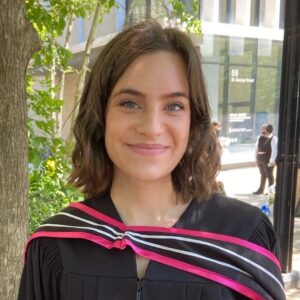Fifteen students from across the University are recipients of the 2024-2025 Inlight Research Fellowships awarded by Inlight Student Mental Health Research, a U of T institutional strategic initiative committed to improving student mental health and wellness outcomes.
This year, the Fellowship Program will offer a training program in addition to funding support for graduate scholars. This one-year non-credit certificate program will support Fellows in developing knowledge and research skills related to post-secondary student mental health and well being.
“The new direction of our Inlight Fellowship Program continues to align with our mandate to support the development of leaders in post-secondary student mental health research. It also provides an opportunity for funding and training support to even more promising scholars as we continue to address the important need for effective and impactful, student mental health research,” says Julius Haag Inlight’s Associate Director, Education and Training, and an Assistant Professor, Teaching Stream in the Department of Sociology at the University of Toronto Mississauga.
Katherine Sainsbury is a PhD student from the Lawrence Bloomberg Faculty of Nursing, and one of the first Nursing students to receive an Inlight Fellowship. Her research interests include a focus on health care transitions for post-secondary students who access in-patient mental health services.
“Currently there is very little research on this topic. My goal is to find ways to improve care pathways between post-secondary institutions and acute mental health services, especially for students transitioning from inpatient psychiatric care back to their schools and communities.” says Sainsbury.
Having previously worked in a crisis and critical care unit at CAMH, Sainsbury was inspired to pursue her research by her experiences caring for patients—many of whom were post-secondary students and young adults in mental health crisis—struggling to balance their academic responsibilities while seeking care.
“I saw an unnecessary struggle for these acutely ill students. They often did not know who to turn to for support with classes and assignments, and there seemed to be little communication between the hospital and their post-secondary schools.” says Sainsbury.
Her hope is that by examining the entirety of the acute mental health care transition cycle—from school to presentation to the emergency department, through inpatient care and reintegration back into the community—she can identify those students at heightened risk and develop more effective supports for these populations.
A key component of Inlight’s research mandate is the focus on student engagement as part of the research process, for Sainsbury, this will include partnering with post-secondary students with lived experience of inpatient psychiatric care to co-design the qualitative components of her work, ensuring they are reflective of the experiences, perspectives, and language of these students.
“The qualitative aspect of my research will involve interviews with students to explore their firsthand experiences accessing inpatient care. I plan to ask about each stage of their ‘care journey’ and about the supports they felt they had—or lacked—throughout.” says Sainsbury.
Mercedes Sobers is a PhD student at the Dalla Lana School of Public Health. Her research focuses on mental health disparities among Black people in Canada, with an emphasis on improving mental health service access and outcomes. Having worked in at CAMH for the last nine years, Sobers says she has been focused on mental health for a long time, but it wasn’t until a Black Physicians Conference in 2018, that the idea for her research was born.
“I heard at that conference someone say that their clients believed that sadness, tears or poor mental health signaled a lack of faith in God. That struck me, because I had heard those words in my own house, and I realized that this view of mental health might be a larger cultural phenomena among the Black population,” says Sobers.
The Inlight Fellowship will specifically help support Sobers’ research project the Black Joy Art Initiative which she says she created as an emotional and creative response to the weight of researching mental health disparity within her own community. The aim of the initiative is to highlight joy, resilience and wellness that the Black community fosters within itself.
“It’s been uplifting to be a part of something like this, because my research is so heavy. It is a form of counterbalance. While I analyze the data that shows disparity in mental health outcomes for Black individuals it is helpful to see how the Black community also thrives,” says Sobers.
With support from the Inlight Fellowship Program, Sobers is looking forward to showcasing the Black Joy Art Initiative at Hart House in May 2025, where students and members of the community can come together to see how different people foster wellness in their own lives.
Here is the full list of Inlight’s 2024 research fellowship award recipients:

Yasmin Aboelzahab is a PhD candidate at the Leslie Dan Faculty of Pharmacy. Her research explores the role of pharmacists in supporting newcomer international students as they transition into the Canadian healthcare system, with a focus on enhancing wellness and improving health outcomes. She holds a master’s degree in Translational Research from U of T where her capstone project addressed psychological stress in patients recently diagnosed with Parkinson’s disease. Her research interests include qualitative research, healthcare services, pharmacy practice, and improving the healthcare experience for newcomers.

Avery Hinchcliffe is a Master’s student in the Faculty of Kinesiology and Physical Education. Her research focuses on interactions among cognitive, behavioural, and emotional symptoms of eating disorders among students. As part of her research, she will engage interested students and student groups throughout the research process and in mobilization of research findings to inform campus policy and practice. Her research aims to develop better understandings of eating disorder symptoms among post-secondary students and to illuminate the potential for intervention targets specific to trait perfectionism, body-related emotions, and lifestyle behaviours on campus.

Jenny Hui is a third-year PhD student in the Counselling and Clinical Psychology program at the Ontario Institute for Studies in Education (OISE). She is passionate about the thriving and resilience of people with intersecting identities and experiences, including racialized, 2SLGBTQIA+, and disabled and chronically ill post-secondary students. Her master’s thesis explored the lived experiences of bisexual East Asian young adults in Canada, and she has co-authored several articles and book chapters focused on social justice and the mental health of 2SLGBTQIA+ young adults. Jenny’s scholarship and clinical practice strives to uplift the stories of people and communities who are under-represented in counselling, psychology, and the social sciences.

Zaiyuan Hu is a third-year PhD student in personality psychology at UTM. Her research focuses on understanding the personality development and mental wellness of racially minorized university students, specifically how their daily life experiences shape long-term changes in their personality and mental wellness. Zaiyuan has co-led the EDIAI mentorship program in the UTM psychology department connecting underrepresented undergraduate students with graduate mentors, and is also actively involved in various university-wide mentorship programs to support racially minoritized students’ academic success and personal growth.

Noah Khan is a third year PhD student in Social Justice Education at the Ontario Institute for Studies in Education (OISE). His research focuses on the intersection of artificial intelligence and emotions, attempting to understand how sociocultural realities influence the emotional dynamics behind engagements with artificial intelligence. Noah is currently a Massey College Junior Fellow, Victoria College Junior Fellow, and a Results Canada Fellow. He has previously held fellowships at the Internet Society and the Sustainable Development Solutions Network Youth. Noah was a co-applicant on a project funded by an Inlight Research Development Grant, entitled Critical Literature Review on Artificial Intelligence Anxiety, which his current project builds upon. Noah has received several awards such as the Canada Graduate Scholarships-Doctoral Award, School of Cities Graduate Fellowship, William Pakenham Fellowship, Centre for Indigenous Educational Research Award, Cornerstone Leadership in Action Graduating Student Award, and more.

Sarah Kuburi is a PhD student in Developmental Psychology and Education at the Ontario Institute for Studies in Education (OISE). Her research examines the mental health of post-secondary students, with a focus on student stress and coping strategies, including self-injury. Sarah is the Lab Manager of the Coping, Affect, and Resilience in Education Lab, overseeing research projects on student mental health and mentoring graduate students. As a Research Trainee at the Centre for Addiction and Mental Health, Sarah leads a project evaluating the impact of clinical dashboards on mental health care, collaborating with youth to integrate their perspectives throughout the research process. She is the recipient of the Canadian Psychological Association’s Academic Excellence Award, the Ontario Graduate Scholarship, and the Canada Graduate Scholarship.

Prisca Obierefu is currently a PhD candidate in the Department of Psychology at UTSC. She is engaged in quantitative research on the measurement invariance of psychological assessments in racialized and non-racialized Black groups. Prisca works closely with her supervisor to advance research in the field of racial discrimination, mental health and psychopathology, with a specific focus on Black racialization. Her research highlights the importance of inclusive practices, including the use of validated psychological assessments such as the MMPI-3 to assess mental health outcomes in Black individuals.

Victoria Parlatore is a PhD student in Higher Education at the Ontario Institute for Studies in Education (OISE), where she also earned her master’s degree in educational leadership and policy. Her research interests include accessibility, student experience in education systems, and lived experiences of mental health disability. She strives to bring more attention to disabled students’ experiences navigating higher education and together offer insights and suggestions for improvements to inform policy and practice. Victoria is also the recipient of the OISE Fellowship, Ontario Graduate Scholarship, and presently, the multi-year Social Sciences and Humanities Research Council (SSHRC) Canada Graduate Scholarship – Doctoral Award.

Zoe Pavlovic is a Master’s student in the Rehabilitation Sciences program at Temerty Medicine. Being a neurodivergent Zoe is deeply passionate about mental health and neurodevelopmental conditions. Her work as a clerk and coordinator in SickKids neonatal intensive care unit supporting patients and their families through very difficult times has demonstrated to her the importance of mental health and wellbeing. Her volunteer work at Holland Bloorview in the Autism Research Center allowed her to contribute to autism research and has provided her with a chance to explore the mental health research space-something she wishes to continue through the Inlight Fellowship.

Katherine Sainsbury is a Registered Nurse, a PhD student at the Lawrence Bloomberg Faculty of Nursing, and a Research Trainee at the Centre for Addiction and Mental Health (CAMH). Her research interests include health care transitions, student mental health, and risk assessment in acute care. Katherine’s doctoral research aims to better understand the experiences and needs of post-secondary students accessing inpatient mental health services.

Mercedes Sobers is a PhD candidate in Epidemiology at the Dalla Lana School of Public Health, and a Connaught Fellow. Her research focuses on mental health disparities among Black people in Canada, with an emphasis on improving mental health service access and outcomes. She leads the Black Joy Art Project, a community-based initiative celebrating wellness and resilience within the Black community. Mercedes has over eight years of experience working at the Centre for Addiction and Mental Health (CAMH), where she coordinated and supported the development and implementation of research and evaluation projects related to the equitable delivery of health services. She is passionate about creating equitable, inclusive mental health interventions, and her work integrates both academic research and community engagement to drive meaningful change.

Stephen Tu is a SSHRC CGS-D and Digital Research Alliance of Canada-funded PhD student and School of Cities Graduate Fellow at the Ontario Institute for Studies in Education (OISE). His research interests include philosophy and theory of higher education, multispecies ethnography, other-than-human stories, environmental humanities, student mental health, post-qualitative inquiry, research-creation, terror management theory, possibility studies, and anti-Asian racism.

Liliana C. Wu is a fourth-year PhD student in psychology at UTM. Before starting her doctoral studies, Liliana gained valuable research experience at SickKids, where she explored child mental health, specifically focusing on sleep duration and internalizing symptoms. Recently, under the supervision of Dr. Norman Farb, she completed a study on gray matter thickness and relapse vulnerability in depression. As student mental health becomes increasingly important, Liliana’s next steps involve developing personalized, web-based mental health interventions to improve student well-being. She also provides mentorship and advocates for mental health awareness through her roles in BRASA and CUPE Local 3902, contributing to initiatives designed to create more inclusive and supportive mental health systems at U of T.

Yuchen Zhang is a PhD student and lab manager at Dr. Feng Ji’s lab in the Applied Psychology and Human Development department at the Ontario Institute for Studies in Education (OISE). Yuchen’s primary research interests include utilizing advanced statistical and data analysis methods within the psychology and education field to better understand complex behavior patterns and outcomes, individuals’ mental health, and the development of intervention and prevention policies in psychology and education settings. In addition to exploring innovative methodologies, Yuchen studies eating disorders, addiction, emotion regulation, and cultural dynamics, with an emphasis on youth and adolescent populations. Her work aims to understand how family dynamics, school environments, and cultural backgrounds influence mental health and individual development.

Yitong Zhao is a PhD candidate in Psychology at UTSC. She holds a master’s degree from Wake Forest University and a bachelor’s degree from East China Normal University. Yitong specializes in the study of interpersonal emotion regulation and well-being, and has contributed to several peer-reviewed publications. She is interested in how people manage their emotions and support others during stress. Yitong has served as a teaching assistant and is engaged in supporting undergraduate students’ academic development through individual-oriented mentorship. She has volunteered with marginalized groups in community service and worked as a research assistant at two non-profit well-being institutions: one focused on enhancing post-secondary students’ mental health and the other on improving children’s well-being in low-income communities. Her research and community efforts explore translating psychological findings into practice and promoting well-being across diverse populations.




